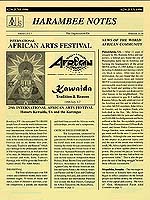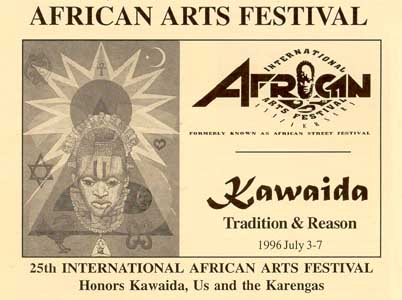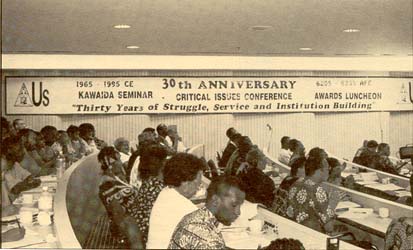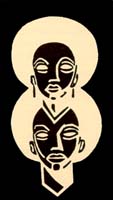| ||||
Volume 2.6-2.7, June and July 1996 Double Issue
| |

|
|

25th International African Arts Festival
Honors Kawaida, Us and the Karengas

Brooklyn, NY -- An estimated 70-100,000 people from all over the world African community will converge here for the 25th annual International African Arts Festival, formerly known as the African Street Festival. One of the largest cultural celebrations in the world African community, the Festival has as its theme this year, "Kawaida: Tradition and Reason" which pays homage to the philosophy and work of The Organization Us, as well as to that of its chair, Dr. Maulana Karenga, and his co-worker and wife, Seba Tiamoyo Karenga, who will be given the Festival's highest award, The Ankh Award.
THE FESTIVAL
The Festival showcases over 300 vendor and exhibition booths, three entertainment stages, 70 hours of music and dance, a host of children's activities, a talent competition, a parade, art, materials and food from around the African world, scholarships, awards and a symposium.
CRITICAL ISSUES SYMPOSIUM
The Symposium, sponsored by the National Association of Kawaida Organizations (NAKO) in conjunction with the IAAF deals with critical issues confronting the world African community. Its theme, reflecting the overall focus of the Festival is "Kawaida Philosophy and Practice: Tradition and Reason." Panels this year include topics of: Independent Black Politics, Black-Brown Unity and Coalition Politics, Resistance to the Embargo Against Cuba, the African American Athlete and Sports Politics, the African American Farmer and the Crisis and Challenge of Retaining the Land, and current events: local, national and international. Panelists will include Mr. Ron Daniels, Campaign for A New Tomorrow; Mr. Richie Perez, Latino Organizer; Ms. Asiba Tupachache, Native American Organizer; Seba Subira Kifano, International Black Women's Congress; Ms. Maisha Ongoza, National Association of Kawaida Organizations; a speaker from the Ogoni People of Nigeria; a representative from Pastors for Peace; Mr. Craig Hodges, formerly of the Chicago Bulls; Mr. Johnny Sample, formerly of the New York Jets and cooperative farmers. Dr. Maulana Karenga will offer an Afrocentric analysis of critical issues in the local, national and international news.
DR. MAULANA KARENGA
In addition to chairing Us and authoring the philosophy of Kawaida, Dr. Maulana Karenga is also chair of the National Association of Kawaida Organizations (NAKO) and creator of Kwanzaa and the
Nguzo Saba
(The Seven Principles). An activist-scholar of international recognition, Dr. Karenga is professor and chair of the Department of Black Studies, California State University at Long Beach, and the Executive Director of the Kawaida Institute of Pan-African Studies and the African American Cultural Center, Los Angeles. He has lectured at the major campuses of this country, in Africa, the People's Republic of China, Cuba, Trinidad, England and Canada on the life and struggle of African peoples. He is also author of numerous scholarly articles and nine books including Introduction to Black Studies, Selections From The Husia, and The African American Holiday of Kwanzaa: A Celebration of Family, Community and Culture. Recently, he served as a member of the National Organizing Committee of the Million Man March/Day of Absence and authored the Mission Statement for this joint project.
SEBA TIAMOYO KARENGA
Ms. Tiamoyo Karenga is a longtime and profoundly committed social activist who has worked in the Movement and in various capacities in the Organization Us since the 60's, serving as: chair of the Legal Committee, chair of the Third World Issues Committee, teacher in its independent school, the School of African American Culture, (now the Mary McLeod Bethune Institute), and an editor of the organization's newspaper, Harambee (now Harambee Notes), and currently serving as its secretary, archivist and administrative assistant to its chair, Dr. Maulana Karenga.
Moreover, she is a member of the Board of Directors of the African American Cultural Center (Us) and a lecturer for the Kawaida Institute of Pan-African Studies. She is also a Seba (moral teacher) in the ancient Egyptian tradition of Maat (Kawaida). A close collaborator and advisor of Dr. Karenga, she has worked with him on national projects such as the National Black Power Conferences, the National Black United Front, and National African American Leadership Summit as well as the Million Man March/Day of Absence organizing project and mission statement. In addition, she has accompanied him on trips to Africa, the People's Republic of China, Cuba, Canada and Britain to work on projects and represent African American people.
Deeply concerned with women issues, she is also a member of the Senut Sisterhood of Us, a sisterhood of the world African community, the International Black Women's Congress and the National Council of Negro Women.
A graduate of California State University, Long Beach with a degree in Black Studies, Ms. Karenga is currently pursuing graduate studies in Black Studies with a subfield focus in ancient African archaeology/ anthropology, especially ancient Egyptian and Nubian archaeology.
Finally, she is currently co-writing with Dr. Karenga a book on the moral texts and moral status of ancient Egyptian women.
THE ORGANIZATION Us AND KAWAIDA
The Organization Us, which simply means us Black people, is so named to stress the communitarian focus of the organization and its philosophy, Kawaida. Us and Kawaida have had a profound and far-reaching effect on Black intellectual and political culture. Thru the teaching and practice of Kawaida, Us emerged in the 60's as a vanguard organization. Us has played a vanguard role in shaping the Black Arts Movement, Black Studies, Black Student Union Movement, Afrocentricity, rites of passage programs, the study of ancient Egyptian culture and the founding of the Association for the Study of Classical African Civilizations, the independent school movement, and African life-cycle ceremonies, the Simba Wachanga youth movement, and Black theological and ethical discourse.
Us has also played a key role in Black United Front efforts serving on the founding and executive committees of the Black Power Conferences of the 60's, the Black United Front, the National African American Leadership Summit, the Black Leadership Retreat and the Million Man March/Day of Absence. It also created the National Association of Kawaida Organizations (NAKO) as a cooperative framework for the many organizations who subscribe to Kawaida philosophy but maintain their own independent structures. (For information on NAKO, East Coast call (718) 398-1729; West Coast call (213) 299-6124).
Finally, with its stress on tradition and reason, the philosophy of Kawaida, especially the Nguzo Saba, is used to develop the mission statements, philosophies, value orientation and goals of various kinds of organizations including family maintenance, school retention, student unions, substance abuse rehabilitation, ex-prisoner support, study groups, cooperatives, etc. Us continues its activities under the motto, "Anywhere we are Us is" and the three basic focuses of "struggle, service, and institution-building."

News of the World African Community
Philadelphia, US. -- After 11 years of struggle by Ms. Ramona Africa and supporters, a federal jury found the city of Philadelphia liable for its bombing and burning the headquarters of the group MOVE on May 13,1985, killing 11 people including 6 children and leaving a whole city block in ashes. After nine days of deliberation, the jury found that the city had: used excessive force and violated MOVE's constitutional protection against unreasonable search and seizure in dropping the bomb and igniting a fire storm that killed the 11 people and destroyed 61 other houses in the neighborhood. The city was ordered to pay $1.5 million to Ramona Africa, the only adult survivor of the bombing and fire and to relatives of two other MOVE members, John Africa, its founder, and his nephew Frank, who both died in the fire. Ms. Africa was awarded $400,000 for pain and suffering and $100,000 for disfigurement and burns suffered in the fire. In a symbolic gesture, former Fire Commissioner, Gilliam Richmond, and former Police Commissioner, George Sambor, were ordered to pay $1 per week each for the next 11 years to the plaintiffs. Although the case was treated in one respect as a personal injury case and the size of the award was relatively small, Ms. Africa rightly described it nevertheless as a blow against abusive state power. She praised the jury as "everyday people who felt that they had to hold the government liable." This is also the purpose she said of her long struggle "to hold these officials accountable."
Mogadishu, Somalia -- The two major rival factions in Somalia have once again begun to inflict casualties on the Somali people and further destroy the infrastructure of the captial and country. The force of Gen. Mohammed Farah Adid and those of Osman Hassan Ali, his former financier, are locked in deadly combat again in the capital firing anti-aircraft missiles, mortar shells, rocket-propelled grenades and heavy and light machine guns. Direct and stray shooting has left many civilians dead and again reveals the continuing problem in Africa of corrupt ruling cliques and classes, rogue military forces, failing states and the longterm continuing effects of the colonial legacy.
Montgomery, Alabama -- A year after becoming the first state to revive chain gangs, Alabama has retreated from this barbaric practice under pressure from legal and social action groups who opposed them. The Southern Poverty Law Center and other lawyers for the prisoners filed lawsuits which challenged chain gangs as cruel and unusual punishment. In response to this legal pressure as well as political pressure, the state agreed to permanently ban chain gangs in an agreement reached by lawyers for the prisoners, state prison officials and the governor. A joint statement to this effect was filed in federal court.

The Senut Sisterhood:
A Sisterhood of the World African Community

The Senut Sisterhood is an auxiliary of the Organization Us. The name "Senut" is an ancient Egyptian word which means "sisterhood." It was chosen to reflect our commitment to using the best of our ancient traditions as the foundation on which to build our lives today. It also reflects our commitment to building principled relationships and support structures with the women of our community. Dedicated to maintaining African womanhood thru teaching and practicing the best of our culture and ethical tradition, our central focus is sisterhood, community service, and social action. Building on the rich legacy of historical Black women's organizations like those of the women's club movement during the early 1900's, we are engaged in:
| 1) | Monthly sisterhood-building activities; |
| 2) | Reading and discussions around critical issues which affect our lives; |
| 3) | Community Service Projects - Collection of food, clothing, supplies for the homeless and needy; Rites of Passage program for young women; and |
| 4) | Social action around issues concerning African women and the African community. |
Purpose and Goals
| 1. | To provide a context for personal development and mutually beneficial friendships and relationships based on the highest cultural and ethical values: mutual respect, reciprocity, trust, and reinforcement. | 2. | To restore, preserve, and promote cultural and ethical values which are essential to the development of African womanhood, sisterhood, and peoplehood. | 3. | To serve as self-conscious models of African womanhood for each other, our present community, and future generations. | 4. | To serve the people of the local, national, and international African community, especially the most vulnerable: the needy, the elderly, the young. | 5. | To provide instruction and support to young African American women in order to assist them in their passage into womanhood and in their efforts toward becoming the best of what it means to be both African and woman. |

The Senu Brotherhood:
A Brotherhood of the World African Community
We, as African American men and members of the World African community, conscious of our responsibility to ourselves, our people and humanity have formed this organization, an auxiliary of the Organization Us:
| 1. | to revive, reaffirm, and promote cultural and ethical values which are contributive to the highest levels of brotherhood, family, community, peoplehood, and humanity; | 2. | to pose and practice models of manhood which are instructive and inspirational to our own generation and those which follow; | 3. | to build and sustain a brotherhood that strengthens and develops us and offers a model to others; | 4. | to initiate, engage in, and support projects which enrich and expand cultural and social life; and | 5. | to serve with commitment and capability the local, national, and international African community whenever and wherever needed. |
We commit ourselves to this project with a self-conscious respect for:
| 1) | our religious and political affiliations; |
| 2) | the demands to honor and build on our great historical legacy; and |
| 3) | obligation to contribute all we can in the way we can to build a better and more beneficial African and human community. |
Membership
 Membership in the Senu Society is open to all male members of the world African
community who are willing to commit themselves to practice and promote:
Membership in the Senu Society is open to all male members of the world African
community who are willing to commit themselves to practice and promote:
| 1) | the highest cultural and ethical values of the African and larger human community; |
| 2) | the highest quality of brotherhood and friendship; and |
| 3) | the highest levels of service to our community, our people, and humanity. |
Significance
The Senu Society is a critical step in harnessing and focusing the intellectual,
emotional, and practical energies of African men, in the service of themselves,
their community, people and humanity. It comes at a critical time, and is
designed as our ancestors, the ancient Egyptians, taught: to raise up that which
is in ruin, to restore that which is destroyed and to build for eternity that we
may live for eternity in both the social and spiritual sense.

Black Church Burnings: --
Position Statements
The Outrage, Terror and Talk of Fire
By Dr. Maulana Karenga
Discussing unspeakable acts of horror and revulsion is always difficult. This is so not only because we often lack adequate words to describe them, but also because we often lack a clear understanding of their nature, motivation and meaning. The 18-month-long spate of Black church burnings presents us with such a case and with the painful and urgent challenge to define it and put a quick and decisive end to it. An initial problem of discussion, after the shock and outrage, is the difficulty of discussing the experiences of people of color in appropriate and dignity-affirming terms in a racially hierarchical society. Both the media and academy seem unequipped to discuss the experiences and aspirations of people of color in terms that would reflect an equality of status and worthiness of equal regard. Thus, the ethical issues involved are reduced to declarations of sorrow and distance from the acts; the political issues to denying conspiracy and racial motivation; the judicial issues to suspicion and investigations of the victims and appropriate posturing in the legislatures and the social issues to a few whites helping to rebuild a few physical structures rather than the over-due need to confront a systemic racism which breeds the worst of human thought and acts. [More]

The Organization Us: Philosophy, Principles, Program
From the beginning, the essential task of our organization Us has been and remains to provide a philosophy, a set of principles and a program which inspire a personal and social practice that not only satisfies human need but transforms people in the process, making them selfconscious agents of their own life and liberation. Such a transformative practice will, of necessity, also lead to the building of moral community and to the constant becoming of the best of what it means to be both African and human in the fullest sense. [More]
Ongoing Programs of Us
Mary McLeod Bethune Institute
An independent educational institute for children ages 3 - 11 which sponsors a
Saturday school program stressing cultural values, critical inquisitiveness,
social responsibility, respect for human diversity and community service.
Kawaida Institute of Pan-African Studies
Annual national summer Institute on Leadership for Social Change which teaches
critical thinking skills from an Afrocentric perspective and leadership
training.
Rites of Passage Program
Collective instruction and support to aid young women and men in becoming
morally and culturally grounded, educationally capable and socially committed.
Senut and Senu Societies
A Sisterhood and Brotherhood of the World African Community which is dedicated
to brotherhood and sisterhood, community service, social action and study.
Mateka Support Program
Provides books, lectures, correspondence
and counselling to prisoners.
Soul Sessions
Weekly lecture/discussion series by local, national and international speakers
on critical issues.
Black and World News Forum
Weekly alternative analysis of the local, national and international news from
an Afrocentric perspective.
Timbuktu Book Circle
An engaging and informative reading and discussion of major and minor works in
African American literature.
Swahili Language and Culture Class
Instruction in the most widely spoken African language in Africa and the
national language of African Americans.
Also available:
Groups tours of the Cultural Center
Ancient Egyptian Studies Library
African American Studies Library
African Marketplace and Gift Shop

Announcements:
-
Million Man March/Day of Absence
Local Organizing Committee (LOC) San Diego Conference - Kawaida Institute of Pan-African Studies
|
Local Organizing Committee (LOC), San Diego Organizing Conference on "Advancing A Strategy For An Empowered Community" (A Policy Challenge to the Republican Convention) 1996 August 10, San Diego, CA |
|
19th Annual Seminar in Social Theory and Practice
1996 August 3-10, Los Angeles, CA Seminar conducted by Dr. Maulana Karenga, professor and chair, Department of Black Studies, California State University at Long Beach and executive director, KIPAS. Call for further information on registration, location, housing and transportation.
2560 W. 54th Street, LA, CA 90043-2613 (323) 299-6124; fax (323) 299-0261 |

At The Center - Selected Audio Tapes Available
| |
|
June 2 Sunday |
"The State of Black People & Politics in California" Mr. Rod Wright, recently elected Assemblyman, 48th District; district administrator, Congresswoman Maxine Waters; member, California Democratic State Central Committee. |
|
June 9 Sunday 3:00pm |
"Puerto Rico: People, Places, & Perspectives" - Slide Presentation & Discussion Mr. Mpinduzi Khuthaza, advocate, Us; chair, Organization and Alliance Committee; freelance photographer. |
|
June 15 Sunday 12:30pm |
Mary McLeod Bethune Institute Saturday School, cultural outing for children ages 3-11. |
|
June 16 Sunday 3:00pm | In honor of Father's Day we will not hold our regular Soul Session today so that each and all of us might do something special with and for our fathers. |
|
June 23 Sunday 3:00pm |
Memorial Celebration of the Life & Work of Ms. Ella Fitzgerald Ms. Natalie Owes-Chatters, community activist, Jazz teacher. Dr. Maulana Karenga, chair, Us; various artists and community participants. |
|
June 30 Sunday 3:00pm |
"Togetherness in Love & Struggle: Reaffirming Tradition and Reason" Dr. Maulana Karenga, professor and chair, Department of Black Studies, CSULB; chair, The Organization Us; author, Introduction to Black Studies. |
| |
|
July 7 Sunday 3:00pm | Due to Us' participation in the annual International African Art Festival and the NAKO (National Association of Kawaida Organizations) Symposium on critical issues in Brooklyn, New York, 3-7 July, our regularly scheduled lecture-discussion will not be held. This year's theme is "Kawaida: Tradition and Reason" in honor of the philosophy and work of the Organization Us, Dr. Maulana Karenga, and his co-worker and wife, Seba Tiamoyo Karenga. (See article, page 1) |
|
July 14 Sunday 3:00pm |
"The Moors in Spain: Towards An Accurate History" - Slide Presentation & Discussion Ms. Yvonne Clark, undergraduate, California State University Dominquez Hills; student of African history; lecturer. |
|
July 21 Sunday 3:00pm |
"CCRI & Affirmative Action: Holding Ground & Defending Gains" Mr. Kalem Aquil, chair, October 16, Organizing Committee. Seba Subira Kifano, assistant director, African American Cultural Center. Mr. Joselito Laundencia, Southern Regional Field Director, Californians for Justice. Mr. Anthony Thigpenn, founder, AGENDA (Action for Grassroots Empowerment and Neighborhood Development Alternatives). |
|
July 28 Sunday 3:00pm |
"Defining the Black Agenda: Burnings, Conventions, and the Reality of Race" Dr. Maulana Karenga, professor and chair, Department of Black Studies, CSULB; chair, Us; director, African American Cultural Center; creator of Kwanzaa; author Introduction to Black Studies and Kawaida Theory (Forthcoming, August 1996) |
Selected Audio Tapes Available
For more information on the Organization Us
and the African American Cultural Center,
please call (323) 299-6124.
Copyright© 1999 Us Organization, All rights reserved.
Reproduction in full or part is prohibited without permission
| • • |
| Last updated: 12/04/99 |

